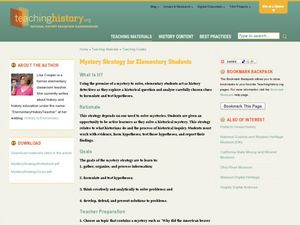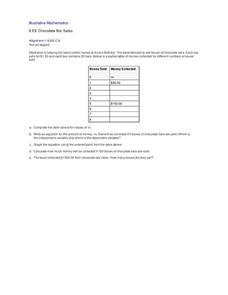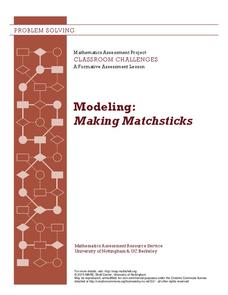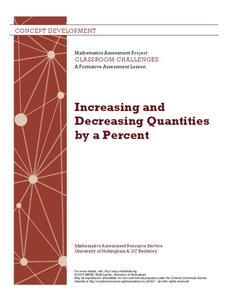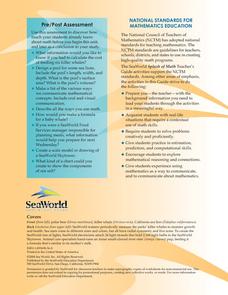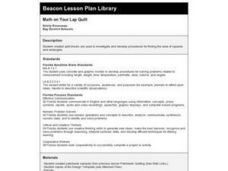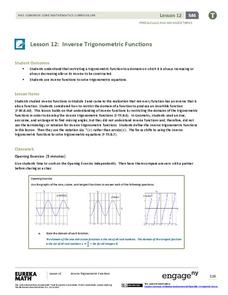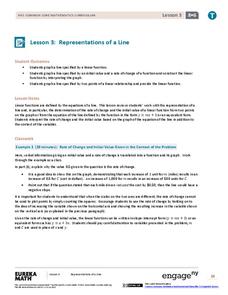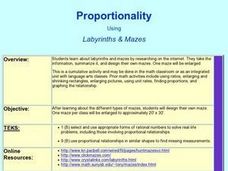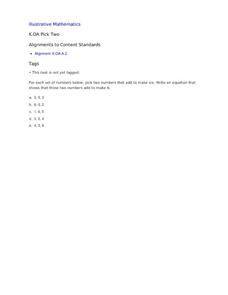EngageNY
Finding a Rate by Dividing Two Quantities
Develop the right station to solve rate word problems. The 18th lesson in a series of 29 starts by interpreting the aspects of rates with two different quantities. Pupils use the interpretation of rates to solve problems, and groups work...
University of Nottingham
Modeling Conditional Probabilities: 2
Bring the concept of conditional probability alive by allowing your classes to explore different probability scenarios. Many tasks have multiple solutions that encourage students to continue exploring their problems even after a solution...
Curated OER
Mystery Strategy for Elementary Students
Learners of all ages solve historical mysteries. Elementary learners research historical topics by organizing information presented by their instructor, formulating hypotheses, and considering solutions to mysteries presented about...
Curated OER
Is This a Rectangle?
How do you show that something is a rectangle? This activity starts with four coordinate points and asks young geometers to explain whether they create a rectangle. Knowledge from both geometry and algebra come into play here, as well...
Illustrative Mathematics
Chocolate Bar Sales
In this real-world example, algebra learners start to get a sense of how to represent the relationship between two variables in different ways. They start by looking at a partial table of values that define a linear relationship. They...
Mathematics Assessment Project
Modeling: Making Matchsticks
Math: The only subject where the solution to a problem is seven million matches. Young scholars first complete an assessment task estimating the number of matches they can make from a tree of given dimensions. They then evaluate provided...
EngageNY
Comparison Shopping—Unit Price and Related Measurement Conversions II
Which rate is greater and by how much? Pupils continue to compare rates to solve problems in the 20th portion of a 29-part series. Rates are presented in a variety of representations either using the same representation or different...
Mathematics Assessment Project
Increasing and Decreasing Quantities by a Percent
As part of a study of percent and percent change, learners first complete an assessment task with several percent change problems. They then complete an activity using cards to create a diagram expressing percent increases and decreases...
Sea World
Splash of Math
How can kids use math to learn about marine life? Combine math skills with science lessons in a resource featuring activities about life in the sea. Kids graph and calculate data, solve complex word problems, measure geometric shapes,...
Mathematics Assessment Project
Comparing Lines and Linear Equations
Scholars first complete an assessment task on writing linear equations to model and solve a problem on a running race. They then take part in a card matching activity where they match equations and graphs of lines to diagrams of fluid...
Mathematics Assessment Project
Generalizing Patterns: Table Tiles
As part of a study of geometric patterns, scholars complete an assessment task determining the number of tiles needed to cover a tabletop. They then evaluate provided sample responses to see different ways to solve the same problems.
Curated OER
Math On Your Lap Quilt
Get creative juices flowing when you allow groups to figure out a procedure for how to find the area of squares and rectangles. They may use the individual patchwork blocks, or they may design one using the Design Template.
EngageNY
Inverse Trigonometric Functions
Build on the understanding of finding angles using trigonometric ratios. Pupils develop the definitions of inverse trigonometric functions by restricting their domains in the 13th lesson of a 16-part series. They use inverse functional...
EngageNY
Equations Involving a Variable Expression in the Denominator
0/0 doesn't equal 0! Begin this lesson by allowing the class to explore the concept of dividing by zero. The introduction allows for discovery and provides meaningful examples of dividing by zero. This understanding leads to solving...
EngageNY
Fraction Multiplication and the Products of Decimals
Class members come up with a hypothesis on the number of decimal digits in the product of two decimals. Learners work in groups to complete several decimal multiplication problems. The results help groups develop a conjecture on the...
EngageNY
Writing and Evaluating Expressions—Multiplication and Division
Don't table the resource on writing expressions for relationships in tables. Scholars investigate relationships between variables and write algebraic expressions involving multiplication and division. These expressions help solve...
Mascil Project
Design and Build Your Own Vacuum Cleaner, Hair Dryer or Toy Car
No vacuum cleaner? No problem, just build your own. Scholars apply knowledge of currents to build a model of either a vacuum clear, a hair dryer, or a toy car. While the class completes the activity, instructors consider gender...
Illustrative Mathematics
Calculator Trouble
When is not solving the expression the correct answer? When you are checking the understanding of a math concept that is not number dependent. The real question being asked here is to look at the initial number, fraction, mixed number,...
EngageNY
Why Were Logarithms Developed?
Show your class how people calculated complex math problems in the old days. Scholars take a trip back to the days without calculators in the 15th installment of a 35-part module. They use logarithms to determine products of numbers and...
Curated OER
Science NetLinks: Adolescent Sleep
Wake up, sleepy head! High schoolers craft a creative presentation that represents how they feel when they wake up on a school morning. After the presentations, a reading of Academic Sleep Times and Academic Performance launches a...
EngageNY
Using Trigonometry to Find Side Lengths of an Acute Triangle
Not all triangles are right! Pupils learn to tackle non-right triangles using the Law of Sines and Law of Cosines. After using the two laws, they then apply them to word problems.
EngageNY
Representations of a Line
Explore how to graph lines from different pieces of information. Scholars learn to graph linear functions when given an equation, given two points that satisfy the function, and when given the initial value and rate of change. They solve...
Curated OER
Proportionality Using Labyrinths and Mazes
Conduct research on the Internet about labyrinths and mazes to learn about proportions and ratios. Inquisitive minds design their own maze, one maze is chosen and proportionately enlarged to 20 feet by 30 feet. This is a fun challenge...
Illustrative Mathematics
Pick Two
Learning to break apart numbers into smaller pairs is a critical step young mathematicians take as they develop their number sense. To practice this skill, children are provided with sets of three numbers and are asked to pick the two...




